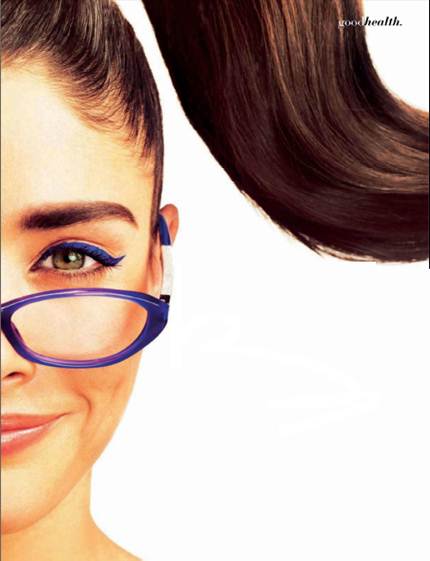Your sight is precious. We look at how to
protect your vision and issues to keep an eye on.

To ensure good sight you need to take care
of your eyes. Yet for many people, it’s something we take for granted. We
gathered the latest research on eye health and spoke to Jared Slater, national
professional services manager of Optometrists Association Australia, to present
all you need to know to ensure good vision for life.
Get checked
The most vital thing you can do for your
eye health is have a comprehensive eye examination every two years – even if
you think you’re seeing well. That’s because most eye diseases can only be
detected by specialized equipment that looks at the front and into the back of
your eyes. “The prevalence of eye diseases, such as age-related macular
degeneration, glaucoma and cataracts, increases with every decade after age
40,” explains Slater. “Often symptoms may not be noticeable early on. Evidence
shows that early detection and treatment will reduce the risk of vision loss
down the track.”
Practise eye-relaxation
If eye strain from excessive screen time is
giving your headaches or blurry vision, do this: every 20 minutes, look away
from the screen for 20 seconds and focus on something in the distance for 20
seconds. Experts call it the 20/20/20 rule. In addition, take a five-minute eye
break away from the screen every hour. Keep blinking, too. “Studies shows that
when we’re concentrating really hard, we blink less frequently, which can lead
to dry eyes,” says Slater.
Quit smoking
It increases your risk of developing
macular degeneration three to fourfold.
Keep active
If you do you could reduce your risk of
developing glaucoma, an eye disease which damages the optic nerve and can lead
to vision loss, say UK experts. In their study, moderate exercise was
associated with a 25 per cent reduction in the risk of low ocular perfusion
pressure (OPP), a risk factor for glaucoma.
Become a shady lady
UV has a cumulative effect on our eyes, so
the more they’re exposed the greater the risk of developing cataracts, macular
degeneration and eyelids cancers later on.
Remember to…
·
Were close-fitting sunglasses on a regular
basis. Look for Australian Standard Category 2, 3 or 4 sunglasses, which block
out about 95 per cent of UV light.
·
Pop on a hat. It’ll reduce UV exposure to your
eyes by 40 per cent.
·
Fit your glasses or contact lenses with clean
in-built UV protection.
·
Wear protective eyewear at the snow or beach. UV
radiation is stronger at higher altitudes and when reflecting off water

Ouch!
Seek immediate help if there’s a change in
your vision such as sudden onset blurred vision or loss of vision. “Any eye
pain or discharge from the eye needs to be checked quickly, along with the
presence of floating spots or flashes of light in your vision, which may
indicate retinal detachment – a tear in the retina at the back of your eye,”
says Slater.
Did you know?
People with dry eyes or those who wear
contact lenses can be predisposed to styes, a mild infection on the eyelid
caused by a blocked tear duct or eyelash follicle. Never squeeze a stye as you
might spread the infection. Treat it by applying a warm compress to the eye
morning and night, and the heat should help resolve it more quickly.
42%: That’s how much women can lover
their risk of developing age-related macular degeneration by eating fish.
A US study revealed that eating one to two
servings of fish per week slashed the risk, compared to women who ate less than
one serve per month. The fish included canned tuna and oily fish containing
omega-3 fatty acids such as salmon, herring, mackerel, anchovies and sardines.
Other high eye-Q foods: Green and yellow
vegies, such as spinach, kale, silverbeet, peas, corn, zucchini, broccoli and
yellow capsicum, contain lutein and zeaxanthin, antioxidants that help protect
eyes.

I
spy … common eye problems
Why are my eyes red?
Red eyes can be a symptom of dry eyes or
tiredness. But it can also be conjunctivitis, an inflammation of the tissue
that covers the white part of the eye. It can be caused by a viral or bacterial
infection, allergies or irritants. Bacterial conjunctivitis is associated with
a yellow green discharge, which may need prescription eye drops.
Why am I suddenly squinting?
You probably need prescription glasses, or
you might be sensitive to light and glare. “The light rays that come through
the center of your cornea are slightly more efficient than the ones that come
through around the edges,” says Slater. “So when we’re not seeing well we squint,
and use the central part of your eyes to see things just a little bit clearer.”
Why are my eyes so dry and gritty?
Medications such as oral contraceptives,
hormone replacement therapy (HRT), antihistamines and diuretics can trigger dry
eyes. They’re also more common as we age. Air conditioning, heating, smoke and
pollution are all environmental causes. If dry eyes are persistent or painful,
lubricating eye drops can help, but see your optometrist, too.